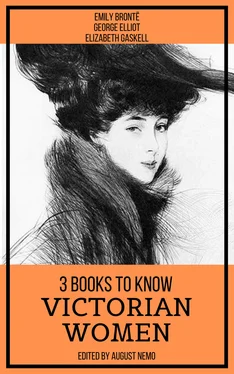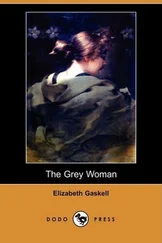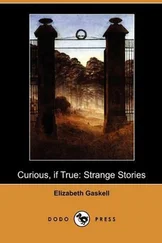"Celia, dear, come and kiss me," holding her arms open as she spoke.
Celia knelt down to get the right level and gave her little butterfly kiss, while Dorothea encircled her with gentle arms and pressed her lips gravely on each cheek in turn.
"Don't sit up, Dodo, you are so pale to-night: go to bed soon," said Celia, in a comfortable way, without any touch of pathos.
"No, dear, I am very, very happy," said Dorothea, fervently.
"So much the better," thought Celia. "But how strangely Dodo goes from one extreme to the other."
The next day, at luncheon, the butler, handing something to Mr. Brooke, said, "Jonas is come back, sir, and has brought this letter."
Mr. Brooke read the letter, and then, nodding toward Dorothea, said, "Casaubon, my dear: he will be here to dinner; he didn't wait to write more—didn't wait, you know."
It could not seem remarkable to Celia that a dinner guest should be announced to her sister beforehand, but, her eyes following the same direction as her uncle's, she was struck with the peculiar effect of the announcement on Dorothea. It seemed as if something like the reflection of a white sunlit wing had passed across her features, ending in one of her rare blushes. For the first time it entered into Celia's mind that there might be something more between Mr. Casaubon and her sister than his delight in bookish talk and her delight in listening. Hitherto she had classed the admiration for this "ugly" and learned acquaintance with the admiration for Monsieur Liret at Lausanne, also ugly and learned. Dorothea had never been tired of listening to old Monsieur Liret when Celia's feet were as cold as possible, and when it had really become dreadful to see the skin of his bald head moving about. Why then should her enthusiasm not extend to Mr. Casaubon simply in the same way as to Monsieur Liret? And it seemed probable that all learned men had a sort of schoolmaster's view of young people.
But now Celia was really startled at the suspicion which had darted into her mind. She was seldom taken by surprise in this way, her marvellous quickness in observing a certain order of signs generally preparing her to expect such outward events as she had an interest in. Not that she now imagined Mr. Casaubon to be already an accepted lover: she had only begun to feel disgust at the possibility that anything in Dorothea's mind could tend towards such an issue. Here was something really to vex her about Dodo: it was all very well not to accept Sir James Chettam, but the idea of marrying Mr. Casaubon! Celia felt a sort of shame mingled with a sense of the ludicrous. But perhaps Dodo, if she were really bordering on such an extravagance, might be turned away from it: experience had often shown that her impressibility might be calculated on. The day was damp, and they were not going to walk out, so they both went up to their sitting-room; and there Celia observed that Dorothea, instead of settling down with her usual diligent interest to some occupation, simply leaned her elbow on an open book and looked out of the window at the great cedar silvered with the damp. She herself had taken up the making of a toy for the curate's children, and was not going to enter on any subject too precipitately.
Dorothea was in fact thinking that it was desirable for Celia to know of the momentous change in Mr. Casaubon's position since he had last been in the house: it did not seem fair to leave her in ignorance of what would necessarily affect her attitude towards him; but it was impossible not to shrink from telling her. Dorothea accused herself of some meanness in this timidity: it was always odious to her to have any small fears or contrivances about her actions, but at this moment she was seeking the highest aid possible that she might not dread the corrosiveness of Celia's pretty carnally minded prose. Her reverie was broken, and the difficulty of decision banished, by Celia's small and rather guttural voice speaking in its usual tone, of a remark aside or a "by the bye."
"Is any one else coming to dine besides Mr. Casaubon?"
"Not that I know of."
"I hope there is some one else. Then I shall not hear him eat his soup so."
"What is there remarkable about his soup-eating?"
"Really, Dodo, can't you hear how he scrapes his spoon? And he always blinks before he speaks. I don't know whether Locke blinked, but I'm sure I am sorry for those who sat opposite to him if he did."
"Celia," said Dorothea, with emphatic gravity, "pray don't make any more observations of that kind."
"Why not? They are quite true," returned Celia, who had her reasons for persevering, though she was beginning to be a little afraid.
"Many things are true which only the commonest minds observe."
"Then I think the commonest minds must be rather useful. I think it is a pity Mr. Casaubon's mother had not a commoner mind: she might have taught him better." Celia was inwardly frightened, and ready to run away, now she had hurled this light javelin.
Dorothea's feelings had gathered to an avalanche, and there could be no further preparation.
"It is right to tell you, Celia, that I am engaged to marry Mr. Casaubon."
Perhaps Celia had never turned so pale before. The paper man she was making would have had his leg injured, but for her habitual care of whatever she held in her hands. She laid the fragile figure down at once, and sat perfectly still for a few moments. When she spoke there was a tear gathering.
"Oh, Dodo, I hope you will be happy." Her sisterly tenderness could not but surmount other feelings at this moment, and her fears were the fears of affection.
Dorothea was still hurt and agitated.
"It is quite decided, then?" said Celia, in an awed under tone. "And uncle knows?"
"I have accepted Mr. Casaubon's offer. My uncle brought me the letter that contained it; he knew about it beforehand."
"I beg your pardon, if I have said anything to hurt you, Dodo," said Celia, with a slight sob. She never could have thought that she should feel as she did. There was something funereal in the whole affair, and Mr. Casaubon seemed to be the officiating clergyman, about whom it would be indecent to make remarks.
"Never mind, Kitty, do not grieve. We should never admire the same people. I often offend in something of the same way; I am apt to speak too strongly of those who don't please me."
In spite of this magnanimity Dorothea was still smarting: perhaps as much from Celia's subdued astonishment as from her small criticisms. Of course all the world round Tipton would be out of sympathy with this marriage. Dorothea knew of no one who thought as she did about life and its best objects.
Nevertheless before the evening was at an end she was very happy. In an hour's tete-a-tete with Mr. Casaubon she talked to him with more freedom than she had ever felt before, even pouring out her joy at the thought of devoting herself to him, and of learning how she might best share and further all his great ends. Mr. Casaubon was touched with an unknown delight (what man would not have been?) at this childlike unrestrained ardor: he was not surprised (what lover would have been?) that he should be the object of it.
"My dear young lady—Miss Brooke—Dorothea!" he said, pressing her hand between his hands, "this is a happiness greater than I had ever imagined to be in reserve for me. That I should ever meet with a mind and person so rich in the mingled graces which could render marriage desirable, was far indeed from my conception. You have all—nay, more than all—those qualities which I have ever regarded as the characteristic excellences of womanhood. The great charm of your sex is its capability of an ardent self-sacrificing affection, and herein we see its fitness to round and complete the existence of our own. Hitherto I have known few pleasures save of the severer kind: my satisfactions have been those of the solitary student. I have been little disposed to gather flowers that would wither in my hand, but now I shall pluck them with eagerness, to place them in your bosom."
Читать дальше












